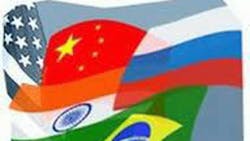Companies from Emerging Countries Outpacing Rivals from Developed Countries
PARIS -- Top companies from emerging markets are riding the rapid growth of their regions and will shape the global economy over the next decade, a study said on Tuesday.
The top 100 fast-globalizing companies from rapidly developing economies are outpacing their rivals from developed economies in terms of expansion, job creation and productivity, said the Boston Consulting Group (BCG) study.
These companies, which it called global challengers, grew at an annual average of 16% from 2008 through 2011, four times the rate of their competitors in developed countries.
Their average revenue hit $26.5 billion in 2011, compared to $21 billion for the non-financial companies listed on the S&P 500 stock index.
"Global challengers are full-fledged competitors making game-changing moves," said the study.
"They are the companies that will shape the global economy over the next decade" including in industries such as aircraft manufacturing, medical devices, mobile telephony and e-commerce.
These companies have benefited, and are in a position to continue to do so, from the fact that emerging markets have become the world's economic engine with growing numbers of consumers with disposable income.
While these global challengers are increasingly being seen as competitors by Western multinationals, the western companies often stand to gain from partnerships, BCG said in the report entitled "Allies and Adversaries."
"The battle is being played out foremost in other emerging countries," Olivier Scalabre of BCG said.
Moving Into Growing Economies
Chinese and Indian companies are rapidly pushing into Africa, Latin America and Southeast Asia, he said.
"It is their top priority because that is where 90% of global economic growth is located," said Scalabre.
Chinese and Indian companies dominate BCG's challenger list, but this dominance has gradually declined during the seven years in which the list has been compiled.
The list now features companies from 17 emerging nations, seven more than in 2006.
The list includes companies such as Brazil aircraft manufacturer Embraer, Chinese mobile telephone makers Huawei and ZTE, Indian pharma groups Dr Reddy's and Sun Pharmaceuticals, Indonesia's Golden Agri-Resources, Malaysian oil and gas company Petronas, Mexican mobile telephone operator America Movil, Russia's Gazprom, and Thai energy company PTT, and Turkish Airlines.
But the companies on the list have no guarantee of success, and run the risk of being knocked off by newcomers, BCG said.
Only seven companies have graduated upwards and off the list in seven years, including UAE's Emirates airline, Mexican cement producer Cemex, and mining companies Vale of Brazil and AngloAmerican of South Africa.
Indonesian agribusiness group Wilmar International, Saudi oil giant Aramco, and SAB Miller of South Africa also graduated from challenger status.
A separate study by HSBC bank found that Western nations had largely failed to capitalize on the rise of the top emerging country China.
Countries which supply China have benefited most from its growth, while "Western nations, faced with internal discord, have failed to grab the opportunity," the bank said.
Industrial exporters to China such as South Korea, Malaysia and Singapore have shared in China's rise, as have commodities suppliers like Australia, Chile, Kazakhstan and Saudi Arabia, said HSBC.
-Richard Lein,AFP
Copyright Agence France-Presse, 2013
About the Author
Agence France-Presse
Copyright Agence France-Presse, 2002-2025. AFP text, photos, graphics and logos shall not be reproduced, published, broadcast, rewritten for broadcast or publication or redistributed directly or indirectly in any medium. AFP shall not be held liable for any delays, inaccuracies, errors or omissions in any AFP content, or for any actions taken in consequence.
